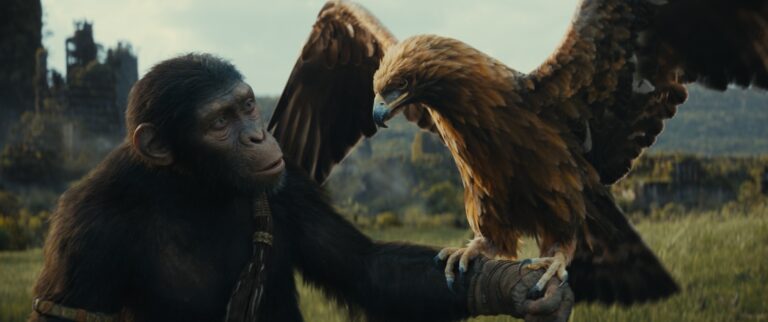Kingdom of the Planet of the Apes (2024 | USA | 145 minutes | Wes Ball)
Over three films in the 2010s, Rupert Wyatt Matt Reeves crafted — with the motion-captured performance of Andy Serkis — a surprisingly successful prequel series exploring the earliest days of what would become a planet ruled by intelligent apes. The Caesar trilogy envisioned a world at a crossroads, one at the precipice of being dramatically transformed by a virus that made humans stupid (prescient, huh?) and gifted their non-human primate brethren super-intelligence and the ability to speak. As the final film in that series ended, Caesar, the lab chimpanzee who started it all had emerged victorious over the humans, leading his non-people to a prosperity that he wouldn’t live to see for himself. Where do you go from there?
With the latest installation, director Wes Ball picks up the baton with Caesar’s funeral and promptly skips “many generations” into the future. By this point, apekind has seemingly flourished and fractured into individual clans where Caesar’s laws still persist but his story has faded into the stuff of legend. Such are the vagaries of oral traditions; these apes can talk and think, but they never learned how to read or developed advanced technology. Instead, the film opens with an introduction to a new style of monkey business: a group of apes in the hills outside what was once Los Angeles who live in thatched tree-fort towers and rely on ritualized symbiotic bonds with golden eagles to supplement their pescatarian diet.
Ball spends the first third of the movie introducing us to these apes through the eyes of a Noa (Owen Teague) and his two best buds as they prepare to find and bond with their own baby birds. Naturalistic and vertiginous sequences patiently track their ascent from forest to craggy mountain peaks to snatch eggs from aeries to raise as their own. Back at home, we meet their elders: Noa’s father is the master of the bird house, his mother is a kindly steward of the rituals of eagle-rearing, and his brother is a majestic eagle who hates his guts. Their foray into the woods also brings them in fleeting contact with a human — a rare sighting as the “herds” were thought to have long since disappeared — which is the beginning of their troubles.
A sense of curiosity and duty finds impulsive Noa chasing down this young human woman after he spots her sneaking some snacks from his family’s fish stores. Like any teen his impulsive decision to sneak out at night will have consequences. In simpler times it might lead to getting grounded, but we’re resetting a blockbuster franchise. So one bad decision will cascade to the fiery downfall of his entire community, threatening their way of life, and sending him on an arduous journey that will drastically reconfigure the balance of power on his planet. All for a stupid bird.
Each set piece in the series of animal adventures is staged captivatingly. Noa’s trek to reunite with his family will find him traversing the post-apocalyptic landscape littered with the hulking remains of forgotten humanity and the perils of those angry roving apes. Confrontations with other apes are scarily consequential — you know you’re in trouble when masked gorillas on horseback show up with electric sticks and balding henchmen. They’re scary by default, but there’s also a creeping unease that works like this spring’s other (less successful) apocalypse-adjacent Civil War, in which the state of play between ape factions aren’t always readily apparent. We’re dropped into this world as confused as our protagonist and left in a state of anxious confusion.
He’ll meet a kindly gay old orangutan in the hills (reliably the best primate and best character in any of these movies); recently widowed via those same dirty apes, who will teach him the ways of Caesar. What’s an apes movie with a little interspecies intrigue? As such, they’ll adopt a young, smelly, human woman (Freya Allan, who does a lot of shivering and glowering) who’ll upend the commonly held Ape Belief that all people lost their ability to speak and form complex thoughts. Together, they’ll discover what’s been going on outside their individual bubbles, encountering a televangelist-like successor to Caesar with a questionable mission on a beachfront compound (Kevin Durand, reveling in egomaniacal menace). Throughout, the visual effects are predictably great, the imagination of a planet in ruin are inventive, and the motion capture convincing.
To a degree, you can appreciate what Wes Ball’s going for allowing the story unfurls at its own pace. Sometimes playing almost like a silent nature documentary, the patient pacing allows ample time to explore the environment and imagine how the world has changed in the vacuum of the fall of humanity and the fragmentation of the apes. If there’s a problem with all this often-interesting, but digressive tourism, it’s that the film is more interested in the world building than any of the characters. No one’s particularly compelling aside from how their archetype reveals something about the story or fits into the cog of the machinery of the series. Noa’s borderline generic and his human counterpart Nova is intentionally cryptic to the point of being a blank slate. Both have streaks of youthful principled exuberance and make a lot of questionable decisions which could charitably be blamed on teen stupidity (instead of uninspired writing). It’s hard to invest in them, so when moments of great consequence arrive, reliance on lofty speechifying can come across as unintentionally laughable without a foundation of character development.
As the film reaches its second hour, it’s hard not to feel a slight sense of disappointment as you realize that you’ve been watching a long a table-setting exercise, albeit one with a cacophonous and consequential finale. It’s full of interesting ideas and speculation and has more than enough high points in this one to merit a big screen viewing. Still, it’s lot of slow-walking for what’s basically an appetizer for what’s yet to come. The epilogue is perhaps the most interesting part of the whole ordeal; so I’ll certainly be back to see what these apes and people get up to next, but couldn’t help wishing that it takes so long to get there.
Kingdom of the Planet of the Apes arrives in theaters on May 10th
images courtesy 20th Century Studios




